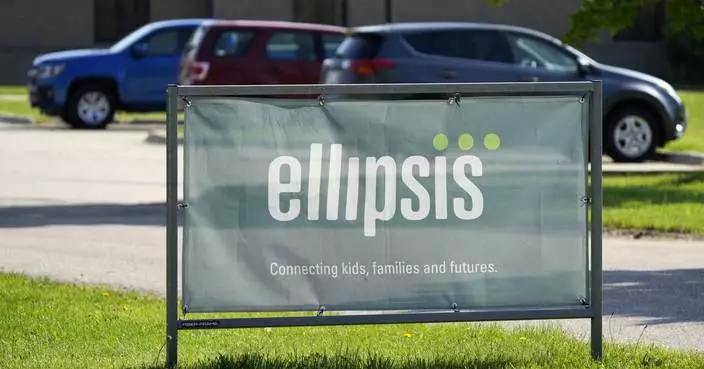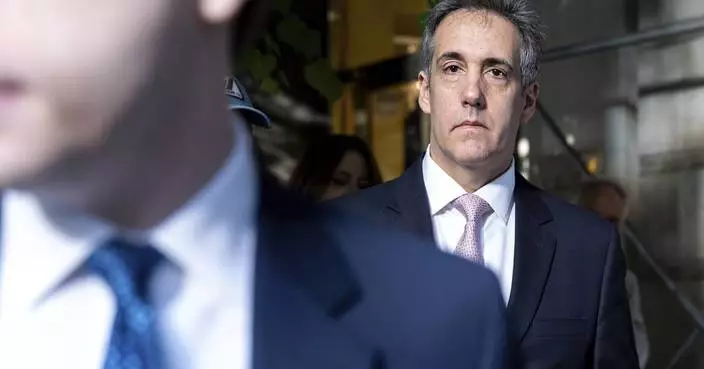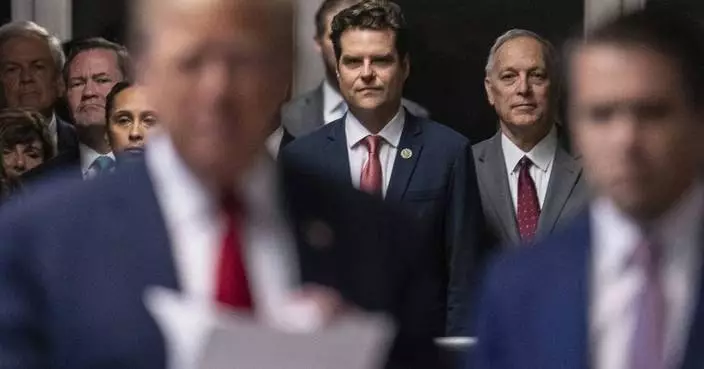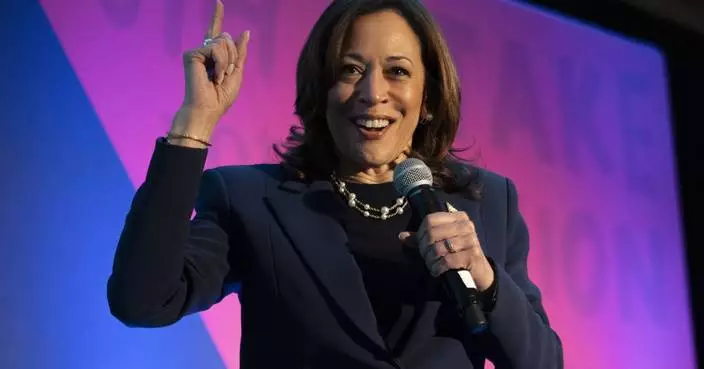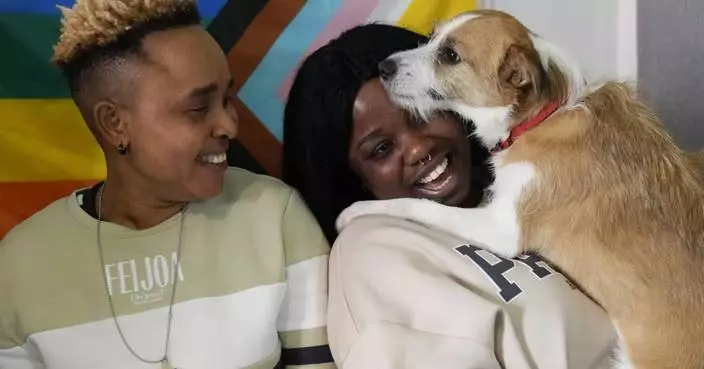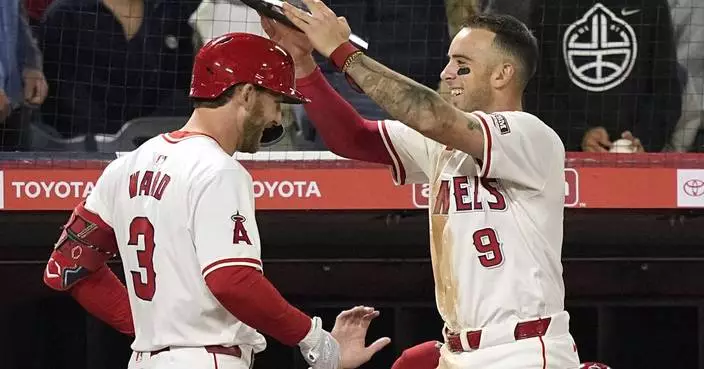As the first two years of President Donald Trump's administration close, Republican allies still haven't figured out how best to influence a leader who takes cues from the forces that swept him to office and seems to fear losing them above all else.
Republicans on Capitol Hill and even the president's closest advisers have been whipsawed over a series of recent actions that show how intently Trump relies on what is sometimes called his gut — an adherence to campaign promises he made that are being reinforced by a constellation of election gurus, Fox News personalities and others who hold sway like few others.
"I know he can be a handful, but he is the president," Sen. Lindsey Graham, R-S.C., told The Associated Press.
On the domestic front, no sooner had Trump signaled he might be backing off his demand for $5 billion to build a border wall with Mexico — easing away from a partial government shutdown — than he took a U-turn after being scolded by conservative allies and pundits, who accused him of wavering on a campaign promise. Now, three days into the shutdown, his budget chief says it could drag into the New Year.
On issues abroad, Trump acted against the advice of his national security advisers and issued a surprise decision to pull troops from Syria. That prompted Defense Secretary Jim Mattis to step down and Trump's special envoy to the coalition fighting Islamic State militants, Brett McGurk, to resign. A drawdown of troops in Afghanistan also appeared to be in the works.
As the stock market tumbled on Christmas Eve, Trump lashed out at the Federal Reserve sowing more uncertainty over his public criticism of chairman Jerome Powell.
Now, as Republicans prepare to relinquish their hold on government, with Democrats taking control of the House in January, the opportunities — and limits — of the GOP alliance with the Trump White House may be running their course.
"I am all alone (poor me) in the White House waiting for the Democrats to come back and make a deal," the president tweeted.
Over and again, Trump has shown himself to be more of a tactical, than strategic, thinker, acting to avoid short-term pain rather than seeking long-term gain.
When Congress was about to keep the government running without a fight over border wall money, Trump felt the outcry from his base and intervened.
Trump told House Speaker Paul Ryan and other Republican leaders at the White House he wouldn't sign a Senate-passed compromise bill, which would have kept border security money at $1.3 billion, not the $5 billion he wanted for the wall with Mexico.
The House and Senate gaveled in for a brief Christmas Eve session Monday only to close up quickly for the holidays.
"Trump is plunging the country into chaos," the Democratic leaders Nancy Pelosi and Chuck Schumer said in a joint statement. "Instead of bringing certainty into people's lives, he's continuing the Trump Shutdown just to please right-wing radio and TV hosts."
Trump's sudden moves on Syria left top Republicans on Capitol Hill criticizing his decision to pull out all of the roughly 2,000 U.S. troops. Senate Majority Leader Mitch McConnell, R-Ky., signed on to a letter with other GOP senators urging Trump to reconsider.
Graham used a weekend luncheon with conservative lawmakers at the White House to impress on the president the rightness of his instinct on both the border wall and the troop withdrawal in Syria, while also sharing with Trump some ideas for smoothing the policy around both issues.
"I told the president, I'm not arguing with your general philosophy," Graham said. "He's a good listener."
Graham reminded Trump that while shoring up the border wall is important, "a Southern wall isn't going to protect you against ISIS."
It's unclear if Trump was listening. The Pentagon said Monday that Mattis has already signed the order to withdraw U.S. forces from Syria.
And Mattis, who was also unhappy with Trump's order to develop plans to pull out half of the 14,000 troops in Afghanistan, was being pushed out two months early. Irritated by a surge of criticism over his decision, Trump said Deputy Defense Secretary Patrick Shanahan will take over as acting secretary on Jan. 1.
Trump's allies chock up the president's year-end moves to a wager that the intense support from his base of voters will continue to propel his electoral chances in 2020 — even if polling suggests otherwise.
An analysis of VoteCast, a nationwide poll of more than 115,000 midterm voters conducted for The Associated Press by NORC at the University of Chicago, highlights the fractures.
A small, but significant slice of voters — the 18 percent who described themselves as only "somewhat" approving of the president — expressed concerns.
Compared with the 27 percent of voters who describe themselves as strong Trump supporters, the "somewhat" Trump voters are much more likely to disapprove of Trump on key issues and have reservations about his personality.
In a warning signs for Republicans, who just lost their House majority in the November election, those voters are more likely to have voted for Democrats in 2018. They are more educated, somewhat more likely to be women, and more likely to live in suburbs.
The president has been busy on the phone to allies on Capitol Hill, talking late into the night with some.
Trump seemed "exuberant" at the luncheon, said one Republican, Sen. Richard Shelby of Alabama, the chairman of the Appropriations Committee, who was the only member of the GOP leadership to attend.
Ryan, who is retiring, and McConnell have become almost side actors to the year-end shutdown they both tried to avoid, but now will partly own. Both offices said it was up to Trump and Democrats to cut a deal.
Shelby said that at lunch Trump did seem like he wanted to reach a deal. At the same time, it's not always clear whether any of the hours of conversation result in decisions that drift too far from Trump's own instinct to stay close to his base.
"I don't think it's imminent we're going to reach a deal," Shelby said. "I wish we could."
Associated Press writers Zeke Miller, Catherine Lucey, Jill Colvin, and Jonathan Lemire contributed to this report.
NEW YORK (AP) — Prosecutors' star witness in the hush money case against Donald Trump was back in the hot seat Thursday as defense lawyers tried to chip away at Michael Cohen’s crucial testimony implicating the former president.
The trial resumed in Manhattan with the potentially explosive defense cross-examination of Cohen, whose credibility could determine the presumptive Republican presidential nominee’s fate in the case.
Cohen is prosecutors’ final witness — at least for now — as they try to prove Trump schemed to suppress a damaging story he feared would torpedo his 2016 presidential campaign, and then falsified business records to cover it up.
The trial was in its 18th day. While the defense is not expected to call many witnesses, talks were ongoing Thursday after court adjourned over the parameters of potential testimony from a campaign finance law expert the defense wants to call to the stand. The trial resumes Monday, when Trump's lawyer Todd Blanche will continue cross-examining Cohen.
Over two days on the witness stand, Cohen placed Trump directly at the center of the alleged scheme to stifle negative stories to fend off damage to his White House bid. Cohen told jurors that Trump promised to reimburse him for the money he fronted and was constantly updated about efforts to silence women who alleged sexual encounters with him. Trump denies the women’s claims.
Trump has pleaded not guilty to 34 felony counts.
The case is the first-ever criminal trial of a former U.S. president and the first of four prosecutions of Trump to reach a jury.
Currently:
— The jurors are getting a front row seat to history — most of the time
— Lies, loyalty and a gag order upheld: Tuesday’s Trump hush money trial takeaways
— Speaker Mike Johnson’s appearance is a remarkable moment
— Trump hush money case: A timeline of key events
— Key players: Who’s who at Trump’s hush money criminal trial
Here's the latest:
Before adjourning, Judge Juan Merchan noted the challenge of managing the trial schedule with myriad upcoming off days.
There’s no court Friday so Trump can attend his son’s high school graduation, and an upcoming four-day weekend for Memorial Day. Court is also not in session on Wednesdays.
Depending on how long the defense case goes, it’s possible the trial could shift to closing arguments as early as Tuesday. Defense lawyer Todd Blanche has said he expects to finish the cross-examination of former Trump lawyer Michael Cohen on Monday morning.
Merchan said he’d like to have both sides give their summations on the same day and could start court early or end late to accommodate that. Or, he said, they may have to spill into another day.
Then, before deliberations begin, Merchan will have to instruct and charge the jury. But the timing of that could be tricky, too, he said.
“It’s not ideal for there to be a big lapse in time between summations and a jury charge,” Merchan said.
With court adjourned and the jury gone for the day, legal arguments are ongoing about the parameters of potential testimony from a campaign finance law expert the defense wants to call as a witness.
Former President Donald Trump’s lawyers have said they may call Bradley A. Smith, a former Bill Clinton-appointed Republican Federal Election Commission member, to refute the prosecution’s contention that the hush money payments at issue in the trial amounted to campaign finance violations.
Prosecutors said they have their own campaign finance expert teed up as a potential expert witness if the defense ends up calling their expert to the stand.
Judge Juan Merchan said he would take some time this weekend to “digest both sets of submission further,” but suggested the potential witness’s testimony would be limited to very general background information.
Defense lawyer Todd Blanche said no decision has been made yet on whether Trump will testify in his own defense.
Trump is charged with felony counts of falsifying business records. In order to convict him, the jury must find that he improperly logged reimbursements to former Trump lawyer Michael Cohen and did so with the intent to commit or hide another crime. Among those other alleged crimes, prosecutors said, were campaign finance violations.
Cross-examination of Cohen will continue Monday.
Donald Trump's former lawyer Michael Cohen acknowledged telling a former prosecutor that he felt porn actor Stormy Daniels and her then-lawyer Keith Davidson were extorting Trump in seeking a $130,000 payment to keep quiet about her claim of a sexual encounter with Trump.
Cohen raised the specter of extortion during a conversation with Mark Pomerantz, who had led the Manhattan district attorney’s investigation of Trump before leaving the office in 2022.
“Yes, I recall making a statement like that … that they were extorting Mr. Trump,” Cohen testified.
“In your mind, there were two choices: pay or don’t pay and the story comes out,” defense lawyer Todd Blanche said.
“Yes, sir,” Cohen replied.
In 2018, Trump decried Daniels’ claims as “false and extortionist accusations.”
In her testimony last week, Daniels denied trying to extort Trump, calling the allegation “false.”
Before Donald Trump's former lawyer Michael Cohen returned to the stand at the start of the day, prosecutor Susan Hoffinger asked the judge to stop Trump’s courtroom “guests” from coming in midtestimony.
On Tuesday, North Dakota Gov. Doug Burgum and Florida Rep. Byron Donalds were among those who came to support Trump in the gallery.
In a sidebar held out of earshot of reporters, Hoffinger told Judge Juan Merchan that on that day, “some of the defense guests filed in the middle of direct examination with their security detail,” and asked that those who came Thursday not be allowed to do so during cross-examination, according to a transcript of the discussion.
“It’s — with their security detail for the jury and the witnesses to see,” Hoffinger said.
Merchan agreed that it was inadvisable, but Blanche, Trump’s defense lawyer, said it was out of his control.
“I have less than zero control over what is happening on anything or anyone that’s behind me when I am crossing a witness,” he said.
Donald Trump watched his former lawyer Michael Cohen as the topic in the cross-examination turned to the suppression of a former Trump Tower doorman’s since-debunked claim that the then-candidate had fathered a child with an employee.
Cohen worked with the National Enquirer to get the tabloid to pay $30,000 for exclusive rights to the story to keep it from coming out — a practice known as “catch and kill.”
Trump's lawyer Todd Blanche emphasized that the 2015 payoff was made even though the story was — according to Cohen, Trump and then-Enquirer publisher David Pecker — false.
And the defense lawyer sought to suggest that squelching the story had nothing to do with Trump’s then-ongoing campaign. Rather, Blanche noted, Cohen told law enforcement that Trump was “concerned about the story because it involved people that still worked with him and worked for him.”
“So it was important to him to keep it from getting out?” Blanche asked.
“Yes sir,” Cohen testified.
The point is important to the defense because it’s trying to undermine prosecutors’ allegation that the hush money payments to the doorman and others were meant specifically to protect Trump’s electoral prospects.
Blanche also sought to sow doubt about whether Cohen has a “specific recollection” of certain phone calls that have come up repeatedly during the trial. To make his point, he asked Cohen to estimate how many phone calls he was receiving each day in 2016 and 2017.
“Hundreds,” Cohen said.
Conservatively, Blanche noted that would mean Cohen was receiving upward of 50,000 calls each year and questioned how Cohen could remember the specific details of certain calls.
“These phone calls are things I’ve been talking about for the last six years,” Cohen testified. “They were and are extremely important and they were all-consuming.”
Donald Trump's lawyer Todd Blanche suggested Michael Cohen breached legal ethics when he secretly recorded himself briefing Trump in September 2016 about an arrangement to buy the rights of former Playboy model Karen McDougal’s story from the National Enquirer.
“You understand it’s not ethical for a lawyer to record a conversation with their client,” Blanche asked Cohen, who was Trump’s personal lawyer at the time.
Cohen conceded it wasn’t ethical, though he noted there were some exceptions — none of which applied in his case, he said. Cohen had testified that he made the recording so he could play it for the tabloid’s publisher at the time, David Pecker, to prove Trump was going to make the deal happen.
“Just so I understand, you surreptitiously recorded your client so that you could play a privileged communication for a third party?” Blanche asked Cohen.
The witness agreed.
Cohen had a propensity to secretly record his conversations, though he said the September 2016 talk was the only one he recorded with Trump.
Blanche said many of Cohen’s recordings — about 40 — involved conversations he had with news reporters. Sometimes, the people Cohen was talking to would ask him if he was recording them, and he denied it, Blanche said.
Asked if he recalled that, Cohen said, “It’s not illegal in New York for one party.”
“Mr. Cohen, I did not ask you if you were breaking the law,” Blanche responded. “I just asked you if you were surreptitiously recording people.”
Donald Trump's lawyer Todd Blanche resumed his understated style of questioning Thursday afternoon at the former president's hush money trial after reaching a crescendo just prior to the lunch break.
Blanche asked former Trump lawyer Michael Cohen as cross-examination continued to rehash his previous testimony in a “timeline fashion.” He began with a moment in 2011, when Cohen created a website to assess his boss’ odds of winning the presidency.
Blanche then segued into Cohen’s role in spinning news stories. In one of the earliest examples, Blanche noted, Cohen helped plant a positive story in the National Enquirer about Trump’s potential presidential bid. That story also included positive information about Cohen, the defense attorney noted.
Blanche sought to suggest that Cohen didn’t always consult Trump about how to fend off or respond to unflattering news stories. Cohen, however, insisted he always did because Trump might “blow up” at him and it could mean the end of his job.
The questions appeared aimed at suggesting that Trump might not have been in on all the machinations surrounding porn actor Stormy Daniels’ claims, though Blanche didn’t specifically ask about that, at least to that point.
Donald Trump's hush money trial will take a three-day weekend because the former president plans to attend the high school graduation of his youngest son, Barron, on Friday.
Judge Juan Merchan had told jurors earlier that because of scheduling — the trial will also not be held on Memorial Day — it might be necessary to hold court next Wednesday, typically a day off for the trial so Merchan can attend to other matters.
But Merchan now says that won’t be the case. Some jurors indicated they can’t attend that day, “so that’s off the table,” the judge said.
Donald Trump's defense attorney Todd Blanche, before court broke for lunch Thursday in the former president's hush money trial, sought to unravel Michael Cohen’s claim that he spoke by phone with Trump “to discuss the Stormy Daniels matter and the resolution of it” just days before wiring her lawyer $130,000.
Cohen, Trump's former lawyer and fixer, testified earlier in the week that he called Trump’s bodyguard, Keith Schiller, just after 8 p.m. on Oct. 24, 2016, as a way of getting ahold of Trump because he knew he’d be with him.
But Blanche noted that at the time, Cohen was dealing with harassing phone calls and had exchanged text messages with the supposed harasser just before contacting Schiller. Blanche cited text message records showing Cohen messaged Schiller at 7:48 p.m. regarding the caller, who’d identified himself as a 14-year-old boy who’d promised not to do it again.
“Who can I speak to about harassing calls to my cell and office,” Cohen wrote to Schiller.
Blanche then cited phone records showing Schiller calling Cohen and leaving a voicemail at 8:01 p.m., followed by a text message stating, “call me,” at 8:02 p.m. Cohen then called Schiller’s number. The conversation lasted one minute and 36 seconds, phone records show.
Blanche said Cohen’s claim that he was talking to Trump about the Daniels deal “was a lie because you were actually talking to Mr. Schiller about getting harassing phone calls from a 14-year-old.”
“Part of it was about the phone calls, but I knew that Keith was with Mr. Trump at the time, and it was more than potentially just this,” Cohen responded.
Blanche, his voice growing louder, was incredulous. After hours of slow and halting questioning, he spoke at a rapid clip as his voice rose to a new octave with a note of disbelief.
“You had enough time in that one minute and 36 seconds to update Mr. Schiller about all the problems you were having with this harassing phone call and also update President Trump on the status of the Stormy Daniels situation?”
Cohen responded that was his belief, based on records he was able to review that he said have refreshed his memory.
“Yes, I believe I was telling the truth.”
“We are not asking for your belief. This jury does not want to hear what you think happened,” Blanche said, even louder, prompting an objection from prosecutor Susan Hoffinger.
Donald Trump's defense on Thursday brought up another embarrassing episode from Michael Cohen’s past — when he supplied his lawyer with nonexistent, AI-generated legal cases to back up an application last year to end his post-prison court supervision early.
As he has said previously, Cohen said he was doing research with an AI tool, and it served up a few cases that sounded useful but turned out to be inventions. He has said he didn’t realize such tools could make things up. His attorney ended up citing the bogus legal rulings in papers that went to a judge.
“Those citations were inaccurate. Not the sum and substance, but essentially the citations themselves,” Cohen testified Thursday, leading to an exchange that illustrated the disbarred attorney’s careful, sometimes hair-splitting responses to cross-examination in Trump's hush money trial.
“When you say the citations were inaccurate, you mean the cases didn’t exist, right?” defense attorney Todd Blanche asked.
“Under that citation, no.”
“The three cases that you gave to your attorney were not real cases, correct?”
“That’s correct,” Cohen acknowledged.
Court broke for lunch soon after.
The defense in Donald Trump's hush money trial sought Thursday to undermine Michael Cohen’s repeated contention that he had no aspirations to work in the White House following Trump’s election victory.
“The truth is, Mr. Cohen, you really wanted to work in the White House, correct?” defense attorney Todd Blanche asked. “No sir,” Cohen replied.
Blanche then referred to a series of text messages, first presented by prosecutors earlier in the week, showing private conversations he’d had in November 2016. In one message, Cohen texted his daughter that he still had a shot of becoming the president’s chief of staff. Another shows Cohen telling a friend that she could serve as his assistant once he gets the position.
Reiterating his previous testimony, Cohen said that while he may have wanted to be considered as chief of staff for “ego reasons,” he was seeking a role as personal attorney to the president.
“I don’t think you’re characterizing this correctly at all,” Cohen said. “My conversations with my daughter, I wanted a hybrid position where I would still have access to President Trump but I would not be a White House employee.”
Outside the courthouse during a Thursday morning break in Donald Trump's hush money trial, conservative Republican lawmakers immediately lit into Michael Cohen’s credibility, levying criticism against him and others that Trump is prohibited from delivering himself.
Rep. Matt Gaetz called Cohen a liar “who committed these lies for his own benefit” and colorfully referenced the case against Trump as the “Mr. Potato Head of crimes, where they had to stick together a bunch of things that did not belong together.”
Gaetz and others, including House Freedom Caucus members Reps. Anna Paulina Luna and Ralph Norman, also criticized the judge’s daughter, something a gag order specifically prohibits Trump from doing. Norman called the whole proceeding “a kangaroo court, plain and simple.”
Throughout the lawmakers’ comments, people nearby shouted criticism and obscenities at them.
Some of the lawmakers who accompanied Donald Trump to court Thursday sat in the front two rows, directly behind the former president, while others were relegated to the back of the gallery because there wasn’t enough room in the rows reserved for the Trump’s entourage.
Those in the front row at Trump's hush money trial appeared to look at their phones for large chunks of the morning, rather than up at the proceedings.
Earlier in the week, the former president’s squad of supporters mostly donned Trump’s favored look of a navy suit and red tie, a display of solidarity.
Trump himself wore the look Thursday, as did Reps. Matt Gaetz, Eli Crane and Andy Ogles. But others showed more color. Rep. Andy Biggs opted for a light gray suit, while Rep. Michael Waltz chose a bright turquoise tie.
At one point, when Trump defense attorney Todd Blanche was discussing one of Michael Cohen’s past appearances before Congress, he drew a chuckle from some of the House members when he observed: “When congressmen ask you questions they tend to go on and on.”
Biggs flashed a knowing grin.
Donald Trump's defense attorney Todd Blanche on Thursday pushed Michael Cohen, repeatedly and emphatically, on his admission that he lied when pleading guilty to some federal charges, including tax fraud, before Judge William Pauley.
Cohen — Trump's former personal lawyer and fixer, being cross-examined in the ex-president's hush money trial — does not dispute the bulk of the defense’s characterizations, though he has couched some of his answers in legalistic terms. Blanche appeared intent on connecting the words “lie” and “lying” to Cohen as often as possible.
In one exchange, Blanche asked Cohen if he agreed “that when you plead guilty to a crime and you’re lying, that’s not accepting responsibility for your conduct?”
After Cohen expressed ambivalence, Blanche continued, “You lied, you lied to the judge when you pleaded guilty,” adding: “Do you think Judge Pauley would have liked to know that you lied to him?”
Cohen initially said he wasn’t sure, before conceding the point. “I am certain he would have,” he said.
The court soon after broke for its morning recess. Trump, who had been sitting placidly with his arms folded across his chest, flashed a thumbs up as he left the courtroom after a reporter asked, “How's Todd doing?”
Donald Trump’s defense attorney Todd Blanche cut off the ex-president’s former lawyer Michael Cohen on Thursday as he attempted to explain why he pleaded guilty to certain offenses he didn’t think he should’ve been charged with.
“I took the global plea that was provided to me,” Cohen said as he was cross-examined at Trump's hush money trial.
“Sir, please don’t make a speech,” Blanche interjected.
Judge Juan Merchan then instructed Cohen to answer Blanche’s questions and avoid tangential answers.
In a lightning round of questions and answers, Blanche pointed out that Cohen has, over time, blamed various other people for his problems, including his accountant, a bank, federal prosecutors and a federal judge.
And, Blanche asked, “You blamed President Trump?”
“Yes, sir,” Cohen replied.
Donald Trump's former lawyer Michael Cohen explained Thursday at the ex-president's hush money trial his own role in New York City’s taxi medallion system, the unusual and archaic economic model that underpins the city’s for-hire vehicle industry.
Cohen owned 32 medallions of an estimated 13,000 citywide that he leased out to Evgeny Freidman, a figure known locally as New York’s “Taxi King.” Cohen pleaded guilty to federal charges that included hiding more than $1.3 million in income that he received from Freidman. Freidman was later sentenced to probation for tax fraud.
“It would be no different than if you were leasing an apartment from somebody,” Cohen said of his relationship with Freidman. “He would lease my medallion or medallions in agreement with the contract, and he would pay me a sum every month whether he made money or not.”
Donald Trump's defense attorney Todd Blanche grilled Michael Cohen on Thursday at the former president's hush money trial about Cohen's 2018 guilty plea to federal charges, including for lying to Congress about a Trump Tower Moscow project.
As he did when pleading guilty, Cohen, Trump's former lawyer and fixer, conceded on the witness stand that he lied to two congressional committees about his contacts with Russian officials. He also said he lied when he said he never agreed to travel to Russia in connection with the project and never discussed with Trump plans to travel to Moscow to support it.
“Just related to that issue, you lied under oath, correct?” Blanche asked.
“Yes sir,” Cohen said.
Blanche dug at Cohen’s motivations for the admitting to prior lies to Congress. Blanche noted that Cohen has repeatedly said he lied out of loyalty to Trump.
Cohen went on to testify that he does accept responsibility for what he did.
Donald Trump’s attorneys in his hush money trial gave jurors a picture Thursday of his former lawyer Michael Cohen’s on-air persona, playing two clips of his podcasts over the years in which he discussed Trump and the potential charges.
In the recordings played in the courtroom, Cohen’s voice was louder, high-pitched and much more animated than the reserved and concise way he’s been answering questions. In one clip from an episode defense lawyer Todd Blanche said was from October 2020, Cohen uses an expletive and says he truly hopes “that this man ends up in prison.”
“It won’t bring back the year that I lost or the damage done to my family. But revenge is a dish best served cold,” Cohen says in the clip. He adds: “You better believe that I want this man to go down.”
Blanche asked Cohen if he continued to call Trump various names on his podcasts and when he did interviews on CNN, and Cohen said he did.
“And that has continued even during this trial?” Blanche asked.
“Correct,” Cohen said.
Defense attorney Todd Blanche asked as he cross-examined Donald Trump's former lawyer Michael Cohen about TV interviews he did when news of the former president's indictment in the hush money case emerged last year.
One included a CNN hit in which he compared himself and Trump to the biblical David and Goliath.
Cohen confirmed that, in text messages not shown to jurors, an investigator with the prosecutors’ office complimented him on at least one of the interviews, though prosecutors had asked Cohen to refrain from talking to the news media about the case.
Prosecutor Susan Hoffinger disrupted Blanche’s efforts to get the exchanges shown to jurors or read into the record. Hoffinger noted that the messages were heavily redacted, which Cohen said deprived them of important context.
Donald Trump’s hush money trial got off to a slow start Thursday morning, with attorneys halting proceedings to have several sidebar conversations with the judge, including an extended discussion to start the day.
Judge Juan Merchan apologized to the jurors for the delay. The judge told them that it may be necessary to hold the trial next Wednesday because of scheduling, with days off including Memorial Day and this Friday, when Trump will attend son Barron’s high school graduation.
The trial has been taking Wednesdays off so Merchan can attend to other matters.
The stop-and-start continued as defense attorney Todd Blanche began cross-examining former Trump lawyer Michael Cohen and prosecutors objected to the phrasing of several questions.
Republican Reps. Lauren Boebert, Matt Gaetz and Bob Good sat with Trump’s son Eric in the first row of the gallery, behind the former president and the defense table. Rep. Anna Paulina Luna sat in the second row.
Donald Trump's former lawyer and fixer Michael Cohen entered the courtroom in the ex-president's hush money trial carrying a bottle of water and his eyeglasses case in his left hand.
He strode confidently and briskly to the witness stand, not looking in Trump’s direction. Trump also did not look toward Cohen, instead gazing straight ahead.
The defense's cross-examination of Cohen resumed soon after.
Beforehand, an officer instructed lawmakers in the audience to put their cellphones away, a rule that applies to everyone in the courtroom to watch the trial.
“People are going to ask about it,” the officer said, noting the big concern is people taking pictures of the proceedings, which is forbidden.
Donald Trump returned to court Thursday in his hush money trial and once again complained about it, telling reporters before entering the courtroom that “the crime is that they’re doing this case.”
Trump was flanked by a large group of congressional allies, including Republican Reps. Matt Gaetz of Florida and Bob Good of Virginia. Trump said the members joining him are “up in arms over this.”
He also complained about the security presence outside the courthouse.
“Outside it’s like Fort Knox, you can’t get within three blocks of this place if you’re a civilian,” Trump said, even though the area is accessible to the public.
Trump folded papers in his hand as he entered, followed by his lawyers, a cadre of Republican lawmakers and support staff.
Some lawmakers who joined Trump in court were forced to sit in the back row of the gallery because there wasn’t enough room in the rows reserved for the entourage.
The chair of the far-right House Freedom Caucus, Rep. Bob Good, of Virginia, appeared Thursday morning with Rep. Matt Gaetz, of Florida, outside Trump Tower to support Donald Trump shortly before the indicted former president left for court.
Gaetz is not a member of the Freedom Caucus but is a top Trump ally. Several other Republicans were expected Thursday at the court.
The House Oversight Committee, led by Republicans, postponed a morning meeting until evening, as GOP lawmakers made their way to New York.
As part of their attack on the justice system, Republicans on the panel are considering Thursday a contempt-of-Congress resolution against U.S. Attorney General Merrick Garland in a separate matter, over their investigation of President Joe Biden’s handling of classified documents.
The former president waved before getting into his motorcade and heading to the courthouse for the day.
After months of questions about whether general election debates would happen, President Joe Biden and Republican nominee Donald Trump have agreed to participate in two of them: one in June and one in September.
The first debate will play out in a jam-packed and unsettled political calendar, before either candidate becomes his party’s official nominee at the summer conventions.
The June 27 match-up will come after the expected conclusion of Trump’s criminal hush money trial in New York, foreign trips by Biden in mid-June to France and Italy, and the end of the Supreme Court’s term.
The second debate would take place before most states begin early voting — though some overseas and military ballots may already be in the mail.
Some of the most explosive moments in Donald Trump’s hush money trial have played out for most of the world to see — except for the people who are actually deciding his fate: the jury.
The 12-person panel is shown evidence and witness testimony so they can decide whether the former president is guilty of a scheme to buy up and bury seamy stories in an effort to illegally influence the 2016 presidential election. But it’s a highly curated experience; jurors are not getting the full picture seen by those who follow along each day.
They don’t even witness Trump enter or exit the courtroom. He’s already there by the time they are brought into the room, and he stays until they are dismissed. This is by design.
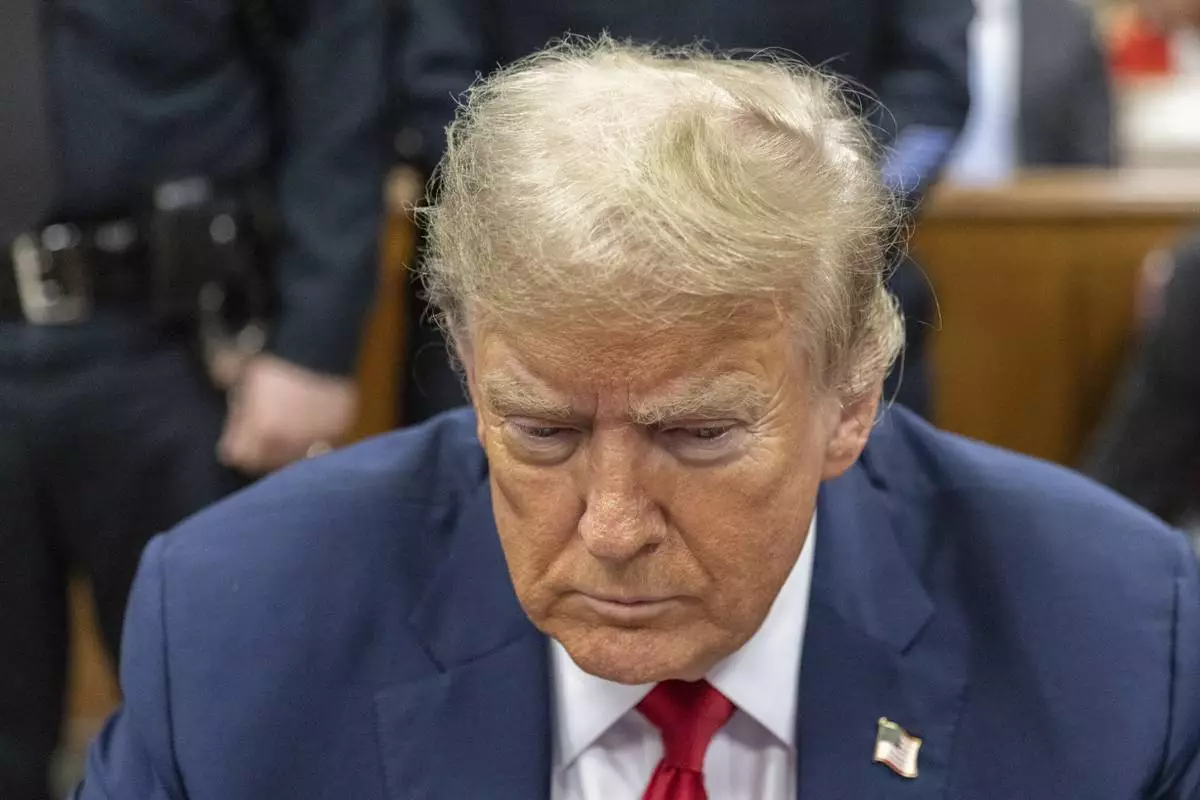
Former President Donald Trump appears at Manhattan criminal court before his trial in New York, Thursday, May 16, 2024. (Jeenah Moon/Pool Photo via AP)
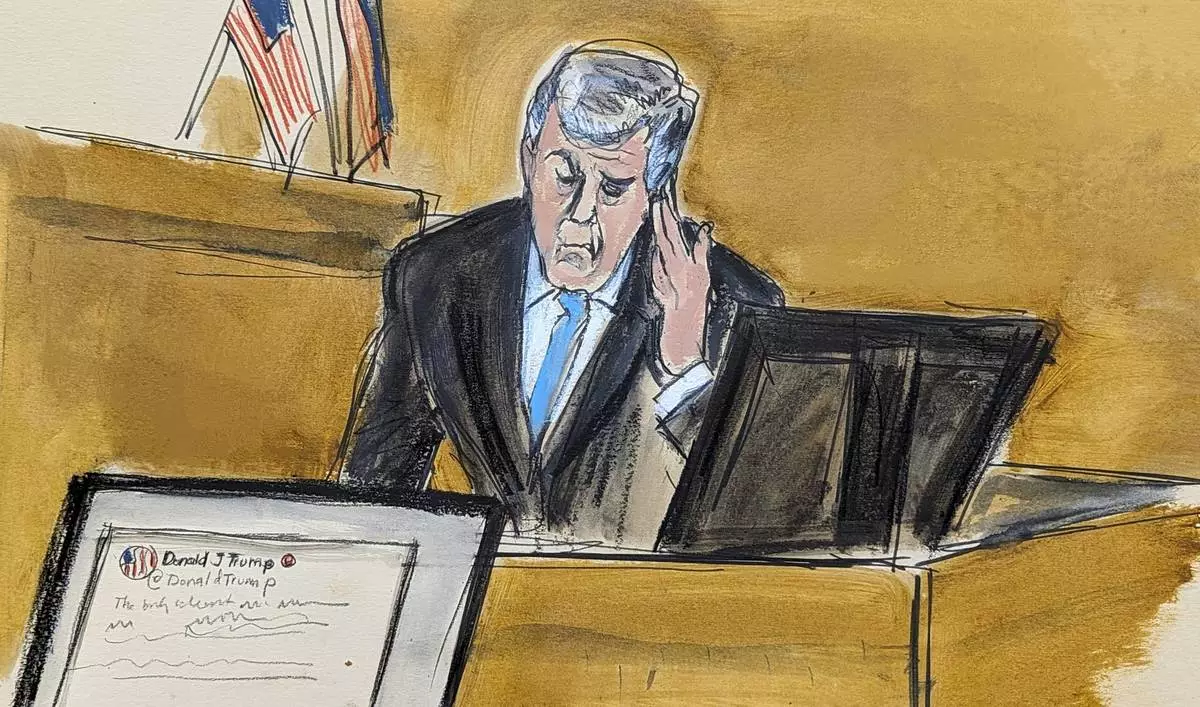
Michael Cohen reacts as he testifies during direct examination in Manhattan criminal court, Tuesday, May 14, 2024, in New York. Donald Trump's fixer-turned-foe Michael Cohen returned to the witness stand Tuesday, testifying in detail how former president was linked to all aspects of a hush money scheme that prosecutors say was aimed at stifling stories that threatened his 2016 campaign. (Elizabeth Williams via AP)

Defense attorney Todd Blanche cross examines Michael Cohen in Manhattan criminal court, Tuesday, May 14, 2024, in New York. Cohen returned to the witness stand Tuesday, testifying in detail how former president was linked to all aspects of a hush money scheme that prosecutors say was aimed at stifling stories that threatened his 2016 campaign. (Elizabeth Williams via AP)

Michael Cohen leaves his apartment building in New York, Tuesday, May 14, 2024. Cohen, former President Donald Trump’s fixer-turned-foe is returning to the witness stand for a bruising round of questioning from the former president’s lawyers. (AP Photo/Seth Wenig)

Former President Donald Trump arrives for talking to the media outside Manhattan criminal court in New York, on Tuesday, May 14, 2024. (Curtis Means/Pool Photo via AP)









